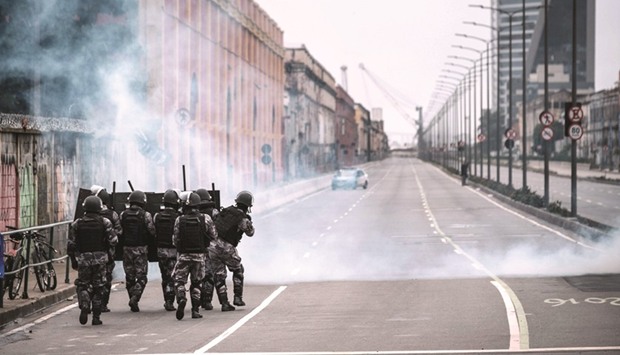Major cities in Brazil were paralysed on Friday by a nationwide strike convened against President Michel Temer’s government reform programme.
The strikes affected all 26 Brazilian states, according to media reports, with Sao Paulo, the country’s economic heart, particularly badly affected.
Ex-president Luiz Inacio Lula da Silva (2003-2010), a former union leader, called the strike a “total success.”
“People decided to strike in protest against the removal of rights, against labour reforms, pension reforms, unemployment and pay cuts,” Lula said to Brasil Atual radio.
Hundreds of workers and trade unionists blocked main arteries and effectively shut down Sao Paulo’s public transit network for a period of hours on Friday.
The metropolis of 12mn people spent the morning without buses, metro or trains, although transport slowly returned to normal in the afternoon.
Protesters set fire to tyres to block roads leading to the city, which is also the centre of the Brazilian trade union movement.
Sao Paulo’s airports, including the largest airport in South America, Guarulhos, all remained in operation despite announcements of work stoppages, although they were subject to restrictions due to roadblocks.
In Rio de Janeiro, protesters clashed with police in afternoon protests in the city centre.
Earlier in the day, groups of striking workers brawled with those on the job as they attempted to block Santos Dumont Airport.
The country’s capital Brasilia was also left without public transport and demonstrators there also turned to fires and barricades to block streets which remained deserted for most of the day.
Protests and shutdowns of public transportation affected cities throughout the country, including Salvador and Natal in the northeast, Belo Horizonte in the southeast, Porto Alegre in the south and Manaus in the north.
The general strike was the country’s first in 21 years and targeted the pension system and labour reforms planned by the conservative government of President Michel Temer.
Despite the widespread nature of the strikes, Justice Minister Osmar Serraglio dismissed the industrial action as a “failure.”
“We didn’t have a strike. What we had was generalised confusion,” he told Jovem Pan Radio on Friday. “It’s not a national strike because commerce is working, industries are working.”
Vagner Freitas, the president of the Central Workers Union, had said before the strike that unions were “very excited” to take to the streets a day after the Chamber of Deputies approved labour reforms which will reduce labour costs, increase working hours and diminish the power of trade unions.
“This puts more fire into the strike,” Freitas said.
The labour reforms must still be approved by the country’s Senate.
The last general strike in Brazil took place in 1996, during the government of Fernando Henrique Cardoso, as a protest over high unemployment and low wages.
Brazil is currently struggling with a serious economic crisis amid two years of recession.
Since coming to power in 2016, Temer has pushed a tough program of cuts and reforms to try to revive the economy.
The South American country expects to exit recession this year, with GDP growth of at least 0.2%.

Police in riot gear fire teargas at protesters blocking the road before the long-distance bus terminal during the nationwide strike called by unions opposing austerity reforms in Rio de Janeiro on Friday.
